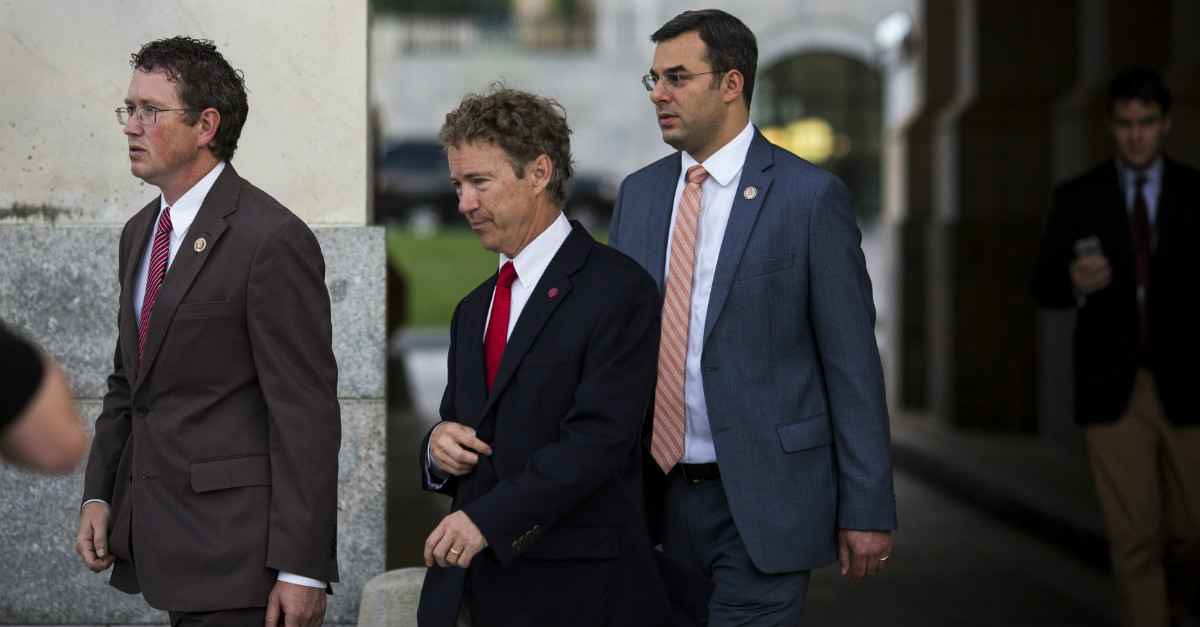The American Health Care Act—the “ObamaCare-lite” legislation championed by most Republicans including President Trump and Speaker Paul Ryan—is dead.
Videos by Rare
And it was the most libertarian members of Congress who did the most to kill it—from the very beginning.
Reason’s Eric Boehm writes, “On January 13, a week before Donald Trump would take the oath of office and just days after the new session of Congress opened, Republicans in the House passed a budget resolution that was the first step, GOP leaders said, to repealing and replacing Obamacare. The bill passed, 227-198, with just nine Republicans defecting from the party-line effort.”
RELATED: The House Freedom Caucus is right to oppose Ryancare because it doesn’t restore competition
“That January 13 vote was the first sign—a telling one, in retrospect—that the Freedom Caucus and other libertarian-leaning members of Congress (like Massie and Sen. Rand Paul of Kentucky) would become the biggest stumbling block to passing the House GOP healthcare plan,” Boehm notes.
And block it, they have. It has been the House Freedom Caucus that has been the most instrumental force in stopping the American Health Care Act, members of which—or even close caucus allies like Rep. Thomas Massie—include the most libertarian members of Congress including co-founder Rep. Justin Amash.
The most well known libertarian Republican active in politics in the U.S. today, Sen. Rand Paul, has also been arguably the most high-profile player in the fight to stop the American Health Care Act as written.
This is significant.
Before Ron Paul’s 2008 and 2012 presidential campaigns spawned a “liberty movement” of activists and political leaders, the influence of which is still being felt to this day (just ask Barack Obama or Donald Trump), you would have had a hard time finding libertarians in Congress period, with the exception of Ron Paul.
But today, and for some time, libertarian Republicans have actually had measurable political clout. This has certainly been true on the foreign policy and civil liberties fronts, where, in 2013, it was Rep. Amash who spearheaded the effort to reign in the NSA’s controversial mass surveillance practices with a bill that was unsuccessful by only 12 votes. Some could argue that Sen. Paul has been instrumental in shaping President Trump’s state and defense cabinet with his denunciations of prominent neoconservatives whose names were floated.
In the House, Rand Paul’s father Ron Paul would often be the sole “no” vote based on his strict constitutionalist principles. Sen. Paul has been known to be the sole “no” vote in the senate—among Republicans or among everyone—where his single vote can sometimes be more effective than a representative’s would be.
Last week, Sen. Paul held up the Balkan nation of Montenegro’s entrance into NATO all by his lonesome, causing the hawkish John McCain to accuse Paul of working for Vladimir Putin.
In 2008, McCain dismissed Ron Paul during presidential debates as an “isolationist,” and most Republicans probably agreed with McCain in that still very hawkish post-George W. Bush GOP environment. In 2017, the son of Ron Paul is mucking up McCain’s ability to put America on the hook militarily for yet another foreign country, and while Paul doesn’t have much Senate support, he does have it elsewhere in conservative and libertarian circles.
Things have changed, and libertarians have benefitted.
Rare’s Barbara Boland writes about how instrumental Paul has been in the House Freedom Caucus’ fight with the GOP establishment over the health care bill, “With the help of Rand Paul in the Senate, the caucus is coming into its own.”
“This time, instead of merely standing against something, the Freedom Caucus is standing for what the Republican Party repeatedly promised constituents: a full repeal of Obamacare,” Boland notes. “It also helps that Paul, a physician from Kentucky, has another replacement bill in the Senate that could actually lower the cost of insurance by eliminating government mandates, giving people the freedom to purchase insurance across state lines, allowing customers to join voluntary larger insurance pools and a host of other free-market reforms.”
Libertarians favor less government, individual choice and free markets in most things, including healthcare. Most conservative Republicans pretend to favor these things too, or at least when Democrats are in control and their hands are tied to actually do anything.
But when Republicans are in control, these one-time small government advocates behave little differently than Democrats in their zeal to “do something.”
RELATED: Hey Republican leadership: Health care reform isn’t just something you “do”
That’s precisely what Paul Ryan and others have been doing, in their rush to jam through a health care bill that retains the individual mandate Republicans used to say was the worst part of Obamacare.
If not for libertarian Republicans, I wouldn’t want much to do with the GOP. They are the best Republicans precisely because they are the most principled.
Thankfully, they also have political muscle now too, as this week reminds us.
Disclosure: I co-authored the 2011 book The Tea Party Goes to Washington with Sen. Rand Paul.



